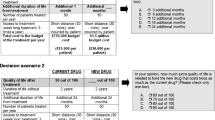Abstract
This article offers a hybrid rhetorical-qualitative discourse analysis of the FDA’s 2011 Avastin Hearing, which considered the revocation of the breast cancer indication for the popular cancer drug Avastin. We explore the multiplicity of stakeholders, the questions that motivated deliberations, and the kinds of evidence presented during the hearing. Pairing our findings with contemporary scholarship in rhetorical stasis theory, Mol’s (2002) construct of multiple ontologies, and Callon, Lascoumes, and Barthe’s (2011) “hybrid forums,” we demonstrate that the FDA’s deliberative procedures elides various sources of evidence and the potential multiplicity of definitions for “clinical benefit.” Our findings suggest that while the FDA invited multiple stakeholders to offer testimony, there are ways that the FDA might have more meaningfully incorporated public voices in the deliberative process. We conclude with suggestions for how a true hybrid forum might be deployed.
Similar content being viewed by others
References
Bakhtin, Mikhail. 1986. Speech Genres and Other Late Essays. Austin: University of Texas Press.
Blythe, Stuart, Jeffrey T. Grabill, and Kirk Riley. 2008. “Action Research and Wicked Environmental Problems: Exploring Appropriate Roles for Researchers in Professional Communication.” Journal of Business and Technical Communication 22:272–298.
Callon, Michel, Pierre Lascoumes, and Yannick Barthe. 2011. Acting in an Uncertain World: An Essay on Technical Democracy. Cambridge, MA: MIT Press.
Coole, Diana, and Samantha Frost. 2011. New Materialisms: Ontology, Agency, and Politics. Durham, NC: Duke University Press.
D’Agostino, Ralph B. 2011. “Changing End Points in Breast-Cancer Drug Approval—The Avastin Story.” New England Journal of Medicine 10:1–3.
Denny, Keith. 1999. “Evidence-Based Medicine and Medical Authority.” Journal of Medical Humanities 20:247–263.
Derkatch, Colleen. 2008. “Method as Argument: Boundary Work in Evidence-Based Medicine.” Social Epistemology 22:371–88.
Fahnestock, Jeanne, and Marie Secor. 1998. “The Stases in Scientific and Literary Argument.” Written Communication 5:427–443.
Food and Drug Administration. 2011. Fast Track, Accelerated Approval and Priority Review: Accelerating Availability of New Drugs for Patients with Serious Diseases. http://www.fda.gov/forconsumers/byaudience/forpatientadvocates/speedingaccesstoimportantnewtherapies/ucm128291.htm. Accessed March 7, 2013.
Food and Drug Administration. 2011. The FDA’s Drug Review Process: Ensuring Drugs Are Safe and Effective. http://www.fda.gov/drugs/resourcesforyou/consumers/ucm143534.htm. Accessed March 7, 2013.
Glaser, Barney, and Anselm Strauss. 2007. The Discovery of Grounded Theory: Strategies for Qualitative Research. New Brunswick, NJ: Aldine Transaction.
Graham, S. Scott. 2011. “Dis-ease or Disease? Ontological Rarefaction in the Medical-Industrial Complex.” Journal of Medical Humanities 32:167–186.
Graham, S. Scott, and Carl G. Herndl. 2011. “Talking Off-Label: A Nonmodern Science of Pain in the Medical-Industrial Complex.” Rhetoric Society Quarterly 42:145–67.
-----. 2013. “Multiple Ontologies and the Rhetoric of Pain: Towards a Post-Plural Rhetoric of Science.” Technical Communication Quarterly 22:103–125.
Hall, Lisa Cox. 1998. “Illness, Identity, and Survivorship: Modern and Postmodern Breast Cancer Narratives.” Illness, Crisis, & Loss 6:255–274.
Harris, Randy A. 2005. Rhetoric and Incommensurability. West Lafayette, IN: Parlor Press.
Keränen, Lisa. 2010. Scientific Characters: Rhetoric, Politics, and Trust in Breast Cancer Research. Tuscaloosa: University of Alabama Press.
Lambert, Helen. 2006. “Accounting for EBM: Notions of Evidence in Medicine.” Social Science and Medicine 62:2633–45.
Lewis, Carol. 2009. Advisory Committees: FDA’s Primary Stakeholders Have a Say. Last modified June 18. http://www.fda.gov/ForConsumers/ByAudience/ForPatientAdvocates/PatientInvolvement/ucm123870.htm. Accessed March 9, 2013.
Little, Miles, Christopher F. C. Jordens, Kim Paul, Emma-Jane Sayersa, Jane Ann Cruickshanka, Jantine Stegemanb, and Kathleen Montgomery. 2002. “Discourse in Different Voices: Reconciling N = 1 and N = Many.” Social Science and Medicine 55:1079–87.
Mayer, Robert J. 2004. “Two Steps Forward in the Treatment of Colorectal Cancer.” New England Journal of Medicine 350:2406–08.
Miles, Matthew, and Michael Huberman. 1994. Qualitative Data Analysis. Thousand Oaks, CA: Sage Press.
Mitchell, Gordon R., and Kathleen M. McTigue. 2012. “Translation Through Argumentation in Medical Research and Physician-Citizenship.” The Journal of Medical Humanities 33:83–107.
Mol, Annemarie. 2002. The Body Multiple: Ontology in Medical Practice. Durham, NC: Duke University Press.
Mykhalovskiy, Eric, and Lorna Weir. 2004. “The Problem of Evidence-Based Medicine: Directions for Social Science.” Social Science and Medicine 59:1059–1069.
National Cancer Institute. 2011. FDA Approval for Bevacizumab. http://www.cancer.gov/cancertopics/druginfo/fda-bevacizumab. Accessed March 7, 2013.
Petersen, Alan. 2003. “Governmentality, Critical Scholarship, and the Medical Humanities.” Journal of Medical Humanities 24:187–201.
Pivot, Xavier, S. Verma, C. Thomssen, J.L. Passons-Coelho, L. Latini, E. Ciruelos, M. Silva, R. vonMoos, H. Chang, and D.W. Miles. 2009. “Clinical Benefit of Bevacizumab (BV) Plus First-Line Docetaxel (D) in Elderly Patients (pts) with Locally Recurrent (LR) or Metastatic Breast Cancer (MBC): AVADO Study.” Journal of Clinical Oncology 27 (15S): S1094.
Pollack, Andrew. 2010. FDA Rejects Use of Drug in Cases of Breast Cancer. New York Times, December 16. http://www.nytimes.com/2010/12/17/health/policy/17drug.html?_r=0. Accessed June 2011.
Prelli, Lawrence J. 2005. “Stasis and the Problem of Incommensurate Communication: The Case of Spousal Violence Research.” In Rhetoric and Incommensurability, edited by Randy A. Harris, 294–331. West Lafayette, IN: Parlor Press.
Robert, Nicholas J., Véronique Diéras, John Glaspy, Adam M. Brufsky, Igor Bondarenko, Oleg N. Lipatov, Edith A. Perez, Denise A. Yardley, Stephen Y. T. Chan, Xian Zhou, See-Chun Phan, and Joyce O’Shaughnessy. 2009. “RIBBON-1: Randomized, Double-Blind, Placebo-Controlled, Phase III Trial of Chemotherapy with or without Bevacizumab (B) for First-Line Treatment of HER-2-Negative Locally Recurrent or Metastatic Breast Cancer (MBC).” Journal of Clinical Oncology 27 (15S): S1005.
Sackett, David L., R. Brian Haynes, Gordon H. Guyatt, and Peter Tugwell. 1985. Clinical Epidemology: A Basic Science for Clinical Medicine. Boston: Little, Brown and Company.
Segal, Judy. 1993. “Strategies of Influence in Medical Authorship.” Social Science and Medicine 37:521–530.
Spoel, Philippa, and Susan James. 2006. “Negotiating Public and Professional Interests: A Rhetorical Analysis of the Debate Concerning the Regulation of Midwifery in Ontario, Canada.” Journal of Medical Humanities 27:167–86.
Strauss, Anselm L. 1987. Qualitative Analysis for Social Scientists. Cambridge: Cambridge University Press.
Toulmin, Stephen. 2003. The Uses of Argument. Cambridge: Cambridge University Press.
Twombly, Renee. 2011. “Avastin’s Uncertain Future in Breast Cancer Treatment.” Journal of the National Cancer Institute 103:458–460.
Author information
Authors and Affiliations
Corresponding author
Appendix A
Appendix A
Rights and permissions
About this article
Cite this article
Teston, C.B., Graham, S.S., Baldwinson, R. et al. Public Voices in Pharmaceutical Deliberations: Negotiating “Clinical Benefit” in the FDA’s Avastin Hearing. J Med Humanit 35, 149–170 (2014). https://doi.org/10.1007/s10912-014-9277-5
Published:
Issue Date:
DOI: https://doi.org/10.1007/s10912-014-9277-5




